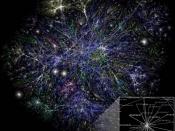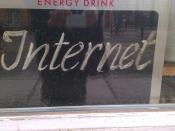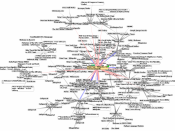As our society continues to increase its demands on energy consumption and
consumer goods, we are likely to attain a higher standard of living while
allowing further deterioration of the environment to occur.
Today, we are often told, we live not simply in an age of information, but in an
age of excessive information. The amount and availability of information seem to
be increasing at an exponential rate. We feel that our entire world is moving,
changing, mutating, at an accelerated pace. Our interactions with this world of
information seem plagued by an increasing sense that we cannot keep up, can't
take it all in, that we are being overwhelmed by information, deluged by data:
the sense of an information overload.
One of the first attempts to represent this kind of information overload appears
in Ted Mooney's 1981 novel, Easy Travel to Other Planets. There, Mooney
describes A Case of Information Sickness in the following terms:
If information was once considered the solid ground, the factual basis, on which
to make decisions and take actions, it no longer seems to be so.
Indeed,
information no longer seems to be solid at all. Not only does it not provide a
grounding, a foundation, from which to see, know, or act, it comes to be seen as
obscuring our vision, our attempts at knowledge, our ability to control the
forces of the world. Information, it might be argued, has become precisely what
all that is solid melts into. Information flows; it spreads; it dissolves all
boundaries, all attempts to contain it. Thus, it is hardly surprising that we
increasingly feel ourselves enveloped by a rising tide of information, immersed
within it, feeling at once exhilarated and overwhelmed. Whether we figure it as
gaseous or liquid--an atmosphere or an ocean, smog...


